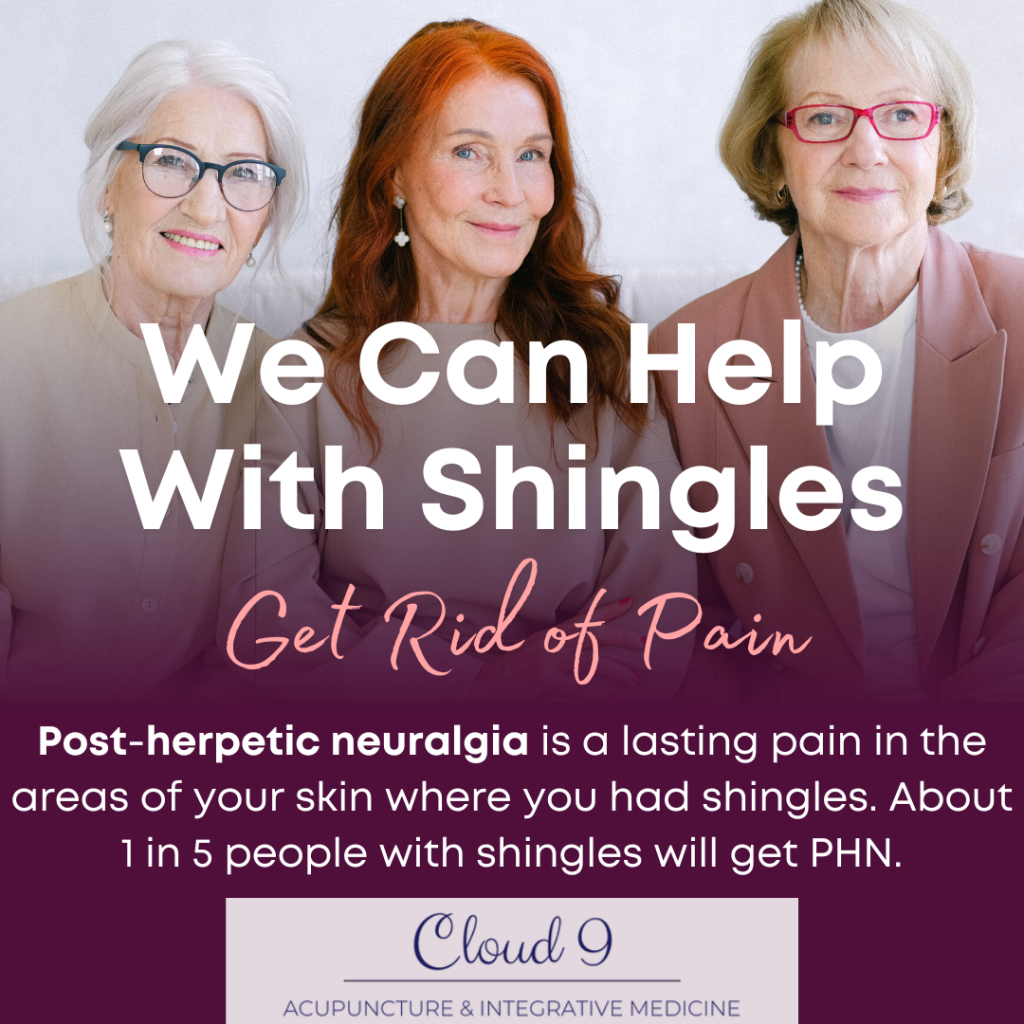- Cloud 9 Acupuncture & Integrative Medicine22 West Padonia Rd. Suite A-203
Timonium, MD 21093 - By Appointment Only
-
Latest Articles:
- • Add These 10 Immune-Boosting Foods to Your Fall Diet •
- • Keep Your Skin Healthy and Glowing with these Fall Skincare Tips •
- • Beat End of Year Burnout with these Fall Self-Care Rituals •
Acupuncture Studies
Can Acupuncture Help with Peripheral Neuropathy?
Peripheral neuropathy is a condition that affects the nerves in the hands, feet, arms, and legs. It can cause a variety of symptoms, including numbness, tingling, pain, and weakness. There is no cure for peripheral neuropathy, but there are treatments that can help to relieve symptoms.
Acupuncture is a traditional Chinese medicine treatment that involves inserting thin needles into specific points on the body. It is thought to work by stimulating the body’s natural healing abilities.
There is some evidence that acupuncture can be effective in relieving the symptoms of peripheral neuropathy. A study published in the journal Pain Medicine found that acupuncture was effective in reducing pain and improving function in people with diabetic peripheral neuropathy.
Another study, published in the journal Neurology, found that acupuncture was effective in reducing pain and improving sleep quality in people with HIV-associated peripheral neuropathy.
If you are considering acupuncture for peripheral neuropathy, it is important to talk to your doctor first. Acupuncture is not a cure for peripheral neuropathy, but it may be able to help to relieve your symptoms.
How Does Acupuncture Work for Peripheral Neuropathy?
The exact mechanism by which acupuncture works for peripheral neuropathy is not fully understood. However, it is thought that acupuncture may help to reduce inflammation, improve blood flow, and stimulate the release of pain-relieving chemicals in the body.
Acupuncture is also thought to help to improve the function of the nervous system. This may be due to the fact that acupuncture can help to restore the balance of yin and yang, which are two opposing forces that are thought to govern the body in traditional Chinese medicine.
Is Acupuncture Safe for Peripheral Neuropathy?
Acupuncture is generally considered to be a safe treatment for peripheral neuropathy. However, there are some risks associated with acupuncture, such as bleeding, bruising, and infection. It is important to see a qualified acupuncturist who is experienced in treating peripheral neuropathy.
If you are considering acupuncture for peripheral neuropathy, here are some things to keep in mind:
- Make sure to see a qualified acupuncturist who is experienced in treating peripheral neuropathy.
- Be aware of the risks associated with acupuncture.
- Be patient. It may take several treatments before you see improvement in your symptoms.
If you are looking for a natural way to relieve the symptoms of peripheral neuropathy, acupuncture may be a good option for you. Call today to begin with a consultation to find out if you’re a good candidate for treatment.

Can Acupuncture Help Rheumatoid Arthritis?
Rheumatoid arthritis is a chronic autoimmune disease that causes inflammation and pain in the joints. It can also affect other parts of the body, such as the skin, eyes, and lungs. There is no cure for rheumatoid arthritis, but there are treatments that can help to manage the symptoms.
Acupuncture is a traditional Chinese medicine technique that involves inserting thin needles into specific points on the body. It is thought to work by stimulating the body’s natural healing mechanisms. Acupuncture has been shown to be effective in treating a variety of conditions, including pain, nausea, and anxiety.
There is some evidence that acupuncture may also be helpful for rheumatoid arthritis. A small study published in the journal Rheumatology found that acupuncture was effective in reducing pain and improving function in people with rheumatoid arthritis. Another study, published in the journal Pain, found that acupuncture was effective in reducing pain and inflammation in people with rheumatoid arthritis.
If you are considering acupuncture for rheumatoid arthritis, it is important to talk to your doctor first. Acupuncture is not a cure for rheumatoid arthritis, but it may be a helpful way to manage the symptoms.
How Does Acupuncture Work for Rheumatoid Arthritis?
The exact way that acupuncture works for rheumatoid arthritis is not fully understood. However, it is thought to work by stimulating the body’s natural healing mechanisms. Acupuncture points are located on meridians, which are channels that carry qi, or energy, throughout the body. When needles are inserted into these points, they are thought to help to balance the flow of qi and restore the body’s natural balance.
Is Acupuncture Safe for Rheumatoid Arthritis?
Acupuncture is generally considered to be a safe and effective treatment for rheumatoid arthritis. However, there are some potential risks associated with acupuncture, such as bruising, bleeding, and infection. It is important to see a qualified acupuncturist who is experienced in treating rheumatoid arthritis.
If You Are Considering Acupuncture for Rheumatoid Arthritis, Here Are Some Things to Keep in Mind:
- Talk to your doctor first. Acupuncture is not a cure for rheumatoid arthritis, but it may be a helpful way to manage the symptoms.
- Find a qualified acupuncturist who is experienced in treating rheumatoid arthritis- like Cloud 9 Acupuncture!
- Be prepared for some bruising and bleeding.
- Acupuncture is not a one-time treatment. It usually takes several sessions to see results.
If you are looking for a natural way to manage the symptoms of rheumatoid arthritis, acupuncture may be a good option for you. Call us for a consultation to get started.

Acupuncture for Chemotherapy-Induced Peripheral Neuropathy (CIPN)
Chemotherapy-induced peripheral neuropathy (CIPN) is a common side effect of cancer treatment that can cause numbness, tingling, and pain in the hands and feet. It can also make it difficult to walk, dress, and perform other daily activities.
Acupuncture is a traditional Chinese medicine treatment that has been shown to be effective in relieving the symptoms of CIPN. It works by stimulating specific points on the body with needles. This can help to improve circulation, reduce inflammation, and promote nerve regeneration.
A study published in the journal “Pain” found that acupuncture was effective in reducing the pain and numbness associated with CIPN. The study participants who received acupuncture also reported improved sleep quality and quality of life.
Another study, published in the journal “Neurology”, found that acupuncture was effective in improving walking ability in people with CIPN. The study participants who received acupuncture were able to walk farther and with less pain than those who did not receive acupuncture.
If you are experiencing CIPN, acupuncture may be a helpful treatment option for you. Talk to your doctor about whether acupuncture is right for you.
What to Expect During Acupuncture Treatment
Acupuncture treatments typically last for 30-60 minutes. The acupuncturist will first assess your condition and then insert needles into specific points on your body. The needles may be left in place for a few minutes or up to 30 minutes.
You may feel some discomfort when the needles are inserted, but this should go away quickly. Some people experience a feeling of warmth or tingling at the acupuncture points.
You can usually resume your normal activities after acupuncture treatment. However, you may experience some mild side effects, such as bruising or soreness at the acupuncture points.
Acupuncture is a safe and effective treatment for CIPN. It can help to reduce pain, numbness, and improve walking ability. If you are experiencing CIPN, call today to set up a consultation.

Microneedling: A New Treatment for Improving Skin Texture and Appearance
Microneedling is a minimally invasive cosmetic procedure that uses tiny needles to create micro-channels in the skin. This allows for better absorption of topical skincare products, as well as the stimulation of collagen and elastin production. As a result, microneedling can help to improve a variety of skin concerns, including:
- Fine lines and wrinkles
- Acne scars
- Stretch marks
- Hyperpigmentation
- Sun damage
Microneedling is a safe and effective treatment that can be performed on all skin types. It is also relatively quick and painless, with most patients experiencing only mild side effects such as redness and swelling.
If you are looking for a new treatment to improve the texture and appearance of your skin, microneedling may be a good option for you. To learn more about microneedling and how it can benefit you, contact our office today.

Acupuncture for Shingles: Can It Help?
Shingles, also known as Post-Herpetic Neuralgia (PHN), is a viral infection that causes a painful rash. The rash usually appears on one side of the body, but it can also appear on the face or neck. Shingles is caused by the varicella-zoster virus, the same virus that causes chickenpox. After you have chickenpox, the virus stays dormant in your body. It can reactivate years later and cause shingles.
There is no cure for shingles, but there are treatments that can help relieve the symptoms. Acupuncture is one treatment that has been shown to be effective in relieving the pain and discomfort of shingles.
Acupuncture is a traditional Chinese medicine (TCM) treatment that involves inserting thin needles into specific points on the body. These points are called acupuncture points. When needles are inserted into these points, it is shown that they can help to eliminate pain.
There is some evidence that acupuncture can be effective in treating shingles. A 2018 study found that acupuncture was effective in reducing pain and improving function in people with shingles. The study also found that acupuncture was well-tolerated and did not have any serious side effects.
Another study, published in 2019, found that acupuncture combined with conventional shingles treatment was more effective than conventional treatment alone in reducing pain and improving function. The evidence suggests that acupuncture can be an effective treatment for shingles.
If you are interested in learning more about acupuncture for shingles, please visit our website or contact us today. We would be happy to answer any questions you have and schedule a consultation with our doctor.


